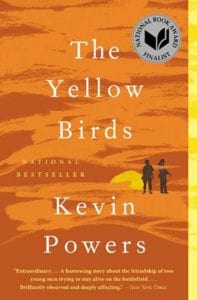
Shelf Unbound:The Yellow Birds succeeds as both an evocative, poetic novel and a high-impact documentary of the horrors of war. Were these aspects equally important to you?
Kevin Powers: Yes. And I would even say that I found it impossible to separate the two. I chose to emphasize the language as a way of highlighting what it was, exactly, that I was trying to document. Instead of simply creating a record of fictional events in time, a catalogue of circumstances if you will, I wanted to use the language as a kind of parallel to the experience of being in a war. I hoped that if the language in the book was strange and immediate and dynamic, but also clear, then a reader would have access to the full spectrum of emotional and sensory confusion that becomes Bartle’s everyday interior life.
Many writers have very capably shown us the kinds of things that happen in war. I expect others yet to come will look at the war and illuminate that terrain with even brighter lights. I wanted to create the portrait of one person looking out from it, and to see what light, if any, would escape.
Shelf Unbound: How soon after returning from serving in Iraq did you start writing the book, and what was your starting point—a character, or a scene, or a specific memory?
Powers: I started writing it about a year or so after I got back. I began by attempting to answer the question, “What was it like over there?” I was asked that question quite regularly and I became fixated on the idea of likeness and its function in the way we understand the world. It seems to me that analogy, comparison, simile, metaphor, whatever, are all inherent in our process of perceiving reality and our constant testing of our perceptions. Whether these relationships fit the patterns we are accustomed to, and so on. I wanted to explore the difficulty of trying to order the world as those relationships broke down. What would you test reality against after all previously held assumptions about the world had proved unreliable? In the face of our most extreme of human experiences, what kind of worldview would you have to cobble together from what remained?
Shelf Unbound: I read that you completely scrapped the first draft of the novel. How come?
Powers: I mostly completely scrapped it. The ideas I mention in response to your previous questions occurred to me as a result of that first draft. I realized that I wanted to make them the focus of the book and that I would have to start over to have any chance of doing so effectively.
Shelf Unbound: Was writing the book cathartic?
Powers: It never occurred to me until this very moment, but that may have been why I needed that first draft. It wasn’t until I started over that I felt like I was writing (however briefly) with the kind of clarity I wanted.
Shelf Unbound: What are you working on now?
Powers: I have a book of poems in a state of relative completion and I’ve started thinking with some determination about my second novel.
